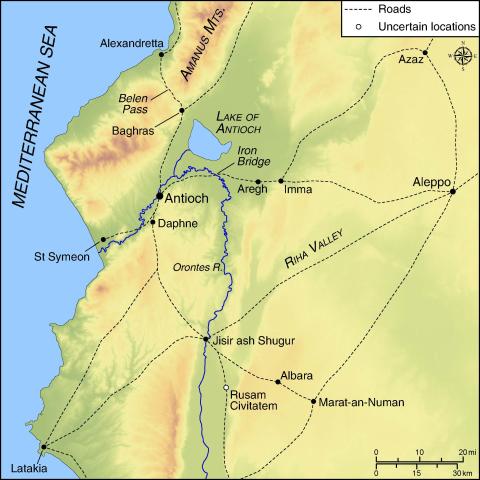Kerbogah Tries to Retake Antioch
[9.27.1] Imprūdēns itaque Stephanus Carnotēnsis comes, quem omnēs nostrī māiōrēs ēlēgerant ut esset ductor nostrōrum, maximā fīnxit sē dēprimī īnfirmitāte priusquam Antiochīa esset capta, turpiterque recessit in aliud castrum, quod vocātur Alexandrēta. Nōs itaque cotīdiē praestōlābāmur eum quātinus subvenīret nōbīs in adiūtōriō quī erāmus inclūsī in urbe, salūtiferō cārentēs auxiliō. At ille postquam audīvit gentem Turcōrum circumcingentem et obsidentem nōs, latenter ascendit super proximam montāneam quae stābat prope Antiochīam, vīditque innumerābilia tentōria, vehementīque captus timōre recessit, fugitque festīnanter cum suō exercitū. Veniēns autem in suum castrum, exspoliāvit illud, et celerī cursū retrō vertit iter.
notes
(June 1098) Stephen of Blois (and Chartres) had been elected commander-in-chief by the other leaders. Before Antioch was taken he had pretended to be ill and gone to the nearby port of Alexandretta. The crusaders, now besieged in Antioch, expect him to come help, but once he sees the size of the Turkish army he retreats.
Stephanus Carnōtensis comes: Stephen, count of Chartres. We haven’t heard about him before, but it turns out he was very important.
ductor nostrōrum: “commander-in-chief” (Hill)
maximā fīnxit sē dēprimī īnfirmitāte: = fīnxit sē dēprimī maximā īnfirmitāte.
Alexandrēta: Alexandretta, modern İskenderun, a seaport about 35 miles north of Antioch / Antakya.
exspoliāvit illud: "he took it away" (his camp, and everything in it).
vocabulary
dēprimō dēprimere dēpressī dēpressum: to be weighed down
infirmitās –ātis, f: sickness, ill-health
praestōlor (1): to stand ready for, await
spoliō (1): to take away (OLD 5c)

